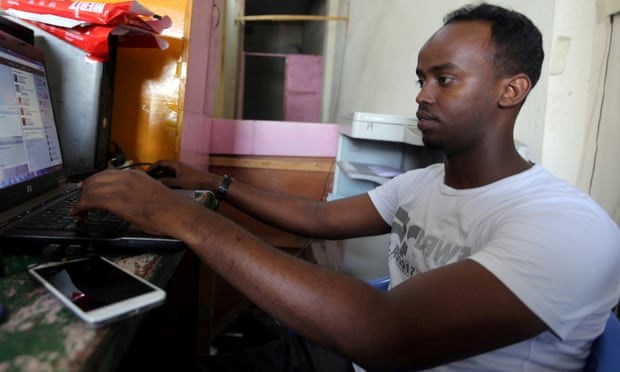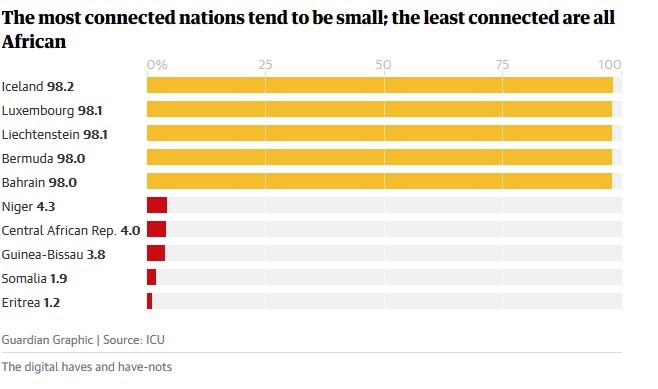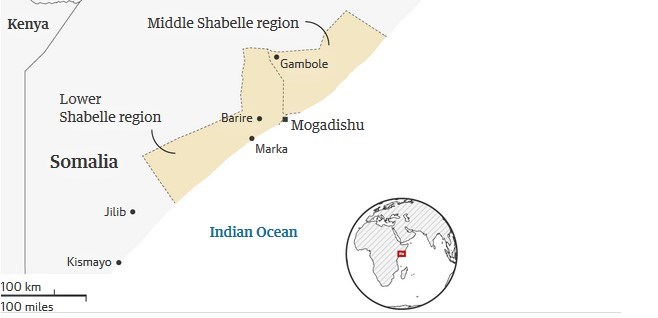
Thursday October 18, 2018
By Abdalle Ahmed Mumin
In Somalia, to be caught with a smartphone in the wrong place can mean death
 Abdifutah Ahmed Hassan browses the internet at the cyber cafe he manages in Mogadishu, Somalia.
Photograph: Feisal Omar/Reuters
Abdifutah Ahmed Hassan browses the internet at the cyber cafe he manages in Mogadishu, Somalia.
Photograph: Feisal Omar/Reuters
Somalia
is not a place for web addicts. Even in the capital, Mogadishu,
coverage is patchy, expensive and unpredictable. Things are slightly
better in the north, but further afield, and anywhere the al-Shabaab
militant group holds sway, there is no internet at all.
All of which means that in the global league of internet access, Somalia is at the bottom, with fewer than 2% of its people regularly online.
This has unfortunate repercussions for locals. In Marka town, Lower
Shabelle region, Anas Farah, 26, who ran a music studio, said he has
been forced to shut his business because of lack of internet service.“I used to download new music from the internet and also post on to
my Facebook to advertise the new music I have got so that customers
could come and buy,” he said. “First al-Shabaab banned the internet and
the internet provider closed the company. There was no money. I could
not survive without internet so I closed the music shop.”
Besides the music, he also downloaded Islamic lectures from the
YouTube and customers would bring their memory cards to be loaded.

The shop was the only source of income for Farah, who is married and
has three children: “I lost my job. Today, if internet access resumes, I
will reopen my shop and make money.”
Some people even find themselves moving cities in order to stay
connected. Ali Sheikh Hamud, 20, a university student who lives near
Barire, said he had to travel regularly to Mogadishu to access the
internet when he was doing his last exam in August this year.
“If they caught me with smartphone, al-Shabaab guys will behead me
and say that I am a spy, so I did not want to risk my life,” he said. “I
traveled to Mogadishu to have my access to the internet. Thank God I
managed to do my university exam.”
Amina Nuur Ibrahim, 19, left her hometown of Jilib for the port city of Kismayo so she could stay in contact with her partner.
“My boyfriend lives in Kenya and he is connected, and as you know
direct phone call is expensive,” she said. “Unfortunately I was not able
to connect, so I left my family in Jilib and came to Kismayo to chat
with my boyfriend and continue to discuss about the plans of our
wedding.”

Al-Shabaab banned people from using smartphones with access to internet and GPS due to fear of its leaders being located.
Mohamed Ali Abukar, 32, a truck driver, leaves his smartphone in
Mogadishu whenever he visits his grandfather in Gambole town, Middle
Shabelle.
“Because I fear for my life, if al-Shabaab men see me with my
smartphone, they would instantly kill me,” he said. “They don’t like
smartphone and internet access as many of the militant commanders were
killed with drones believed to have connected to the smartphone’s GPS.”
Abukar remembers when two young men of his village were detained and
beheaded by al-Shabaab militants after being found with the devices.
“When I am traveling to visit my grandfather who is sick, I leave my
phone and internet behind,” he said. “Until I return back, I do not have
internet access.”